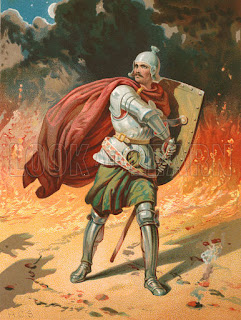Characters from Pilgrim's Progress -- Evangelist
Returning to John Bunyan’s Pilgrim’s Progress, I want to look at another one of his
characters. This book over the years has
been one I return to regularly and read various scenes from because even though
it was written in 1678 still has a profound grip on presenting human behavior
in an incredible way. It was recommended
to me by Brother Harrell in Bridge City a number of years ago. It is rare to dig into this allegory about a
man on a path toward the Celestial City and not come away with some spiritual
benefit.
The next character to assess is a man named Evangelist. This character shows us the impact that a
godly pastor/preacher/teacher can have on one traveling the Christian
path. It is compelling how that Bunyan
begins the book by telling us that it is a story of a man who is walking
through the wilderness of this world. If
ever there were a phrase that could sum up what we are doing as we walk out the
Christian life, it would certainly have to be admitted that we are in the wilderness—morally,
spiritually, mentally, and emotionally.
While there are some who looking for all manner of solutions to save the
world, the society, the environment from whatever deadly challenge it is
facing, there is only one solution—to be born again.
The message of Evangelist is one that is markedly different from
what we are hearing at the present time.
Because I am Pentecostal, that is where the greater concern of my
thoughts comes from. The trends in preaching
seemingly focus on deliverance, miracles, signs, and wonders and a host of
sensational things. In fact, I was
recently a little taken aback by some sensational activities taking place after
a health, wealth, and prosperity message that had everyone tossing their shoes
onto the platform. Where are the
pastors, preachers, teachers, and even prophets who are encouraging personal
godliness, a hunger for holiness, instruction in prayer, and deep teaching of
the Word that marked our movement decades ago.
We have reached a place of incredible shallowness which is demonstrated
in the massive lack of discernment among us.
Instead these character qualities are being replaced with an atmosphere
of “worship” that wants me swinging from the chandeliers, operating in the “power
gifts,” or the salvation of the masses.
What has happened to the simplicity of the gospel and the faithful
discharge of the Word? A. W. Tozer once
noted that if the Spirit vacated many churches, they wouldn’t even notice
because the professional programs have replaced a dependence on the Spirit and
the show would simply go on.
Evangelist shows us another way to conduct biblical ministry. He meets Christian three times during his
travels but his influence is prominent all through the story because of the
things that Christian often remembers that he had said to him and it helped him
to navigate through some of the most treacherous places of his journey. Evangelist does not even remotely resemble
the American power evangelist. A power
evangelist in America is often loud, flamboyant, and anchored very little to
the Scripture. He is the hero of every
message he preaches. He is adept at
wanting to call people out and “read their mail” or have some sensational
healing that would seem to validate his “ministry.” That is not the picture that Bunyan paints of
his character, Evangelist, who merely does his work in the service of the
Kingdom without a lot of fanfare. He
just faithfully, loyally, lovingly, and carefully does the work of an
evangelist. Evangelist is a man who desires
to make full proof of his ministry. He
is not a man given to shrewdness, administration, personal coaching,
motivational speaking, or slothfulness, he is a man who is steeped in prayer
and the ministry of the Word.
His first appearance is in the City of Destruction. He is sensitive to the Spirit but he is also
sensitive to the needs of the people as well.
He frequently walks the fields in and around the City of Destruction
seeking people who might be open to hearing his message of the gospel. On this particular day, he finds Christian,
who at this point has not been converted, but is greatly distressed over the
condition of his soul. Evangelist seeks
to understand what the difficulty is and soon is encouraged to find that this
man is a sinner in need of help. He
tells Christian that he needs to leave the City of Destruction and get on the
path to the Celestial City. He points in
the direction of the Wicket Gate, which is symbolic of passing through the
narrow gate of the new birth, but the sinner whose eyes are blinded by the darkness
cannot see the Wicket Gate. Evangelist
understands this and instead points him toward the shining lights of the
Celestial City which is off in the distance.
The sinner can see that and so Evangelist tells him to get the city in
his line of sight and the gate will be in that path and he can pass through it
and begin the journey.
As Christian makes his exit from the City of Destruction,
there are a host of characters who want to arrest him from going. We may explore some of those characters later
but there is one sinister soul that approaches Christian named Mr.
Worldly-Wiseman. He starts speaking to
Christian and uses a very liberal and atheistic approach to undo everything that
Evangelist has told him. He is preaching
a false gospel that is heretical and damning.
He is a picture of false teachers who were present in the 1st
century and they have multiplied in the 21st century. So, Evangelist comes up to Christian and
again you observe the pastoral roles that come out. Evangelist has formerly been a clarion to
call Christian to salvation but now he will fill the role of teacher,
apologist, and polemicist. The role of a
teacher is an obvious one that the pastor must be able to fill. However, he also must be an apologist which
is a role that answers with a defense when there is an attack on the basic
Christian doctrines. An apologist fills
a role that it crucial but it requires the hard work of study because the
Scriptures are the reservoir of where we gather our material in defense of the gospel. The role of a polemicist is a bit different
in that he does not defend but rather he attacks the false position. If the church will survive in this world,
those who are in ministry must be able to be involved in both of these areas no
matter how squeamish we may be about confrontation. If there is a false position, it must be
attacked if it is endangering the local church.
If there are attacks that come against the apostolic doctrine, it must
be defended. The work that Evangelist
does in confronting Mr. Worldly-Wiseman is both a building mode (as an
apologist) and a battling mode (as a polemicist). We are called as ministers to have both a
sword and trowel in our hands as we build the local church. The man who shrinks back from this is not
doing his job. More and more as we
engage in social media regions, we cannot be afraid to confront error and
defend truth even though it may cost us our reputations.
The last entrance of Evangelist comes directly before
Christian and Faithful make their entrance into Vanity Fair. Before they descend into that hellhole,
Evangelist once again finds the travelers with another angle of pastoral
ministry. At the moment, none of the
travelers, including Evangelist, know that Faithful will be martyred in Vanity
Fair. Evangelist is working to nurture them
but his voice takes on a strident prophetic tone. He does not think of the two converts as
notches on his ministerial gun of accomplishment instead the interaction
between the three gives us insight into how a very concerned pastor would
conduct himself. There are some in the ministry
and in the pews who do not see the necessity of a pastor having input and
association with the members of the church on matters of spiritual priority as
they navigate through a modern-day Vanity Fair.
Evangelist was aware of the enticements, the temptations, the dangers, and
the huge number of voices that would be calling out to them in Vanity Fair and
he was deeply disturbed about their success in making it through. He offers some very strong spiritual medicine—Deny
yourself; take up your cross; and set your face like a flint. There is a striving to enter the strait
gate. He did not want them to let
anything on this side of the world to get into their soul.
There are a few observations that can be brought out from
our look at Evangelist.
Evangelist was an evangelist.
It is still crucial for those who are involved in public ministry of the
church to be interacting with the lost.
We cannot afford to ever come to a place to think we are immune from
efforts at reaching the lost through personal evangelism.
Evangelist was a teacher, an apologist, and a polemicist. This role has been greatly sacrificed in our
generation because of the time commitment required to study the Bible. It is crucial for ministers to do more than read the Bible, they must STUDY the Bible. That means time commitments, study plans, reading
commentaries, and working with words in sermon outlines, Bible study topics,
and even the hard work of writing. If
you would stretch your soul, you must stretch your mind. Make it a point to preach through long
segments of Scripture so the church you pastor will be able to know the Word. When I grow in the Word, the church I serve
grows in the Word.
Evangelist was a prophet.
The preacher/teacher must deal with the hard sayings of Scripture. We have to be willing to move through the passages
of Scripture that promote godliness even at the expense of offending the tares
that hide in the church. We have a
biblical mandate to be very plain-spoken, prophetic, authoritative, and no-nonsense. This is not a blanket covering for
meanness! But we have to show them
Christ and it is important for us cause men to look to their hearts and how the
world affects them.
Evangelist was a holiness preacher.
The preacher/teacher must be a holy man. There are some among us who want to
disassociate themselves from being called a holiness preacher, a holiness
church, or a holiness lifestyle. But if
you will do any work of ministry there must be a great element of holiness
about what you do. What is at stake here
is the condition of the pastor’s soul, he must be a godly man. . . he must be a
holy man. What is it that makes us so
embarrassed about being called a holiness preacher and a holiness church? I understand very clearly some of the cultural
associations that come with such terms but at the same time, I know that early
church in the first century were looked upon as the scum of the earth. Can I expect anything different as I walk
through this wilderness?
Thanks for reading. . .





Comments